An introduction to private equity
An introduction to private equity. Milan - November 2007. What is private equity?. Essentially private equity is an alternative way of owning a company. What is private equity?. Benefits Works closely with management teams to ensure more efficient capital structures are in place
Share Presentation
Embed Code
Link
Download Presentation
- key asset classes
- equity office
- financial services authority
- capital structures
- generally difficult
- private equity fund ii

nora + Follow
Download Presentation
An introduction to private equity
An Image/Link below is provided (as is) to download presentation Download Policy: Content on the Website is provided to you AS IS for your information and personal use and may not be sold / licensed / shared on other websites without getting consent from its author. Content is provided to you AS IS for your information and personal use only. Download presentation by click this link. While downloading, if for some reason you are not able to download a presentation, the publisher may have deleted the file from their server. During download, if you can't get a presentation, the file might be deleted by the publisher.
Presentation Transcript
- An introduction to private equity Milan - November 2007
- What is private equity? Essentially private equity is an alternative way of owning a company
- What is private equity? Benefits • Works closely with management teams to ensure more efficient capital structures are in place • Away from the dividend requirements and short-termist gaze of the public sector, it allows meaningful strategic and operational changes to be made that benefit the longer term interests of the company • Provides facility to acquire businesses to merge with other portfolio companies, benefiting from cost efficiencies • Management’s long term interests are more closely aligned with the other private equity owners • Rewards are directly linked to the value created through buying, building and ultimately selling businesses
- What is private equity? Common Myths and the Reality (…at least of the type of firms we invest with) 1. Private equity buys companies on the cheap, strips the assets and then sells them on for a quick profit Creates value for investors by buying at a fair price and building businesses, not stripping them down • Private equity leverages up companies with unsustainable levels of debt Ensures businesses can pay interest payments required based on the level of earnings the company produces on a deal by deal basis 3. Private equity operates in a shadowy and secret world Maybe true of yesteryear but firms are becoming more open
- What is private equity?Categories of investment Private equity broadly refers to equity investment in companies that are not traded on public stock markets • Buy Outs/Buy Ins: either providing the capital to enable current operating management to acquire an existing business or enabling an external manager to buy into a company • Venture Capital: investments made at an early stage in a company’s life • Development Capital: financing provided for the growth or expansion of a company • Mezzanine Debt: typically debt capital giving the lender rights to convert to an ownership or equity interest if the loan is not paid back in time and in full
- Private equityOutperformed other key asset classes over last five years 30 August 2002 to 31 August 2007. All Figures in USD. Source: Reuter’s Hindsight
- Growth of private equity • The asset class has grown rapidly in recent years, with estimated global commitments increasing from USD18 billion in 1990 to around USD365 billion in 2006 • Record breaking deals over the last year – HCA, Equity Office, TXU • These mega-deals topped previous record of KKR’s USD31.3 billion buy out of RJR Nabisco in 1989 Source: Private Equity Intelligence; Financial News – Private Equity News
- What the credit crunch means for private equity • Problems arose in higher risk credit markets causing a serious mispricing of risk. • Risk Repricing – Credit spreads widening – Significant backlog of loans to be cleared – Further corporate activity is halted until backlog is cleared – Fewer buyouts (particularly the larger ones) – Refinancings limited and exits may take longer than recent times
- What the credit crunch means for private equity • Private equity firms can no longer rely on just cheap debt – Think innovatively • Leverage is still available (selectively!) – Small to mid sized deals can still be done • What of deals agreed prior to the “crunch”? – Not so much of an issue for the private equity investors
- Private Equity – post credit crunch • 2005 and 2006 are considered vintage years for the sector, so has a peak in the cycle been reached? • Many of the factors behind the sector’s success in the last two years still apply: – company balance sheets remain healthy – further global economic growth is forecast – equity valuations still not expensive on a historical earnings basis • Opportunities can now be found in other parts of the capital structure
- The extent of leverage Level of gearing • The amount of debt being put into buyouts has been increasing BUT • It is not near the highs of the 1980s • 1987 debt to equity ratio – 93:7 • 2006 debt to equity ratio – 70:30 • Interest coverage has improved • Interest rates are still historically low
- Invest with the best – and know the market • Avoid private equity firms involved in over aggressive/unrealistic leverage and those paying too much for companies • Get a greater understanding of the whole market • From the lenders point of view – fixed income fund managers • From sellers point of view – public equity fund managers • A diversified approach is all important
- Core HoldingExample – Candover Investments plc Largest Holdings: • Ferretti • Gala Group • DX SMS • Dakota, Minnesota & Eastern Railroad • Hiding Anders • Leading European house • Strong track record and portfolio • In addition to portfolio of private equity, Candover Investments wholly owns Candover Partners • Receives fee income on all other funds Candover Partners runs • A growing fund management business in itself • Focuses on larger European buyouts • Has enjoyed successful realisations since purchase • A good spread of investments by vintage and sector and successful refinancings prior to credit crunch
- Satellite HoldingExample – Evolvence India Holdings Largest Holdings: • GW Capital India Value Fund II • Barings (India) Private Equity Fund II • IL&FS India Leverage Fund • IDFC Private Equity (Mauritius) Fund II • New York Life IM India Fund II • A fund of Indian private equity funds and co-investments • Experienced locally based team with hands on approach • Focus on mid-sized companies • Well diversified by vintage and geography • Major sectors of investment include: • Infrastucture • Engineering & Automotive • Construction • Technology • Life Sciences
- How to invest in private equity? • Private equity funds are generally difficult to access for the everyday investor • Like hedge funds, investors face a series of obstacles: lack of access to funds, size of entry, ability to diversify and lack of investment expertise • Moreover, liquidity is extremely restrictive in this arena with private equity funds commonly implementing long lock-ins in excess of 3 – 5 years
- Forsyth PartnersRegulatory matters This presentation is by Crosby Capital Partners Ltd, which is authorised and regulated by the Financial Services Authority in the UK, and which manages a range of offshore funds (“the Funds”). Application for shares in the Funds can only be made on the basis of the current Prospectuses. The Funds are unregulated collective investment schemes in the UK and their promotion by authorised persons in the UK is restricted by the Financial Services and Markets Act 2000. The price of shares and the income from them can go down as well as up and the value of an investment can fluctuate in response to changes in exchange rates.

Private Equity
Private Equity. Največji vlagatelji v Private Equity Evropa, stanje H1 2011. Vir: European Private Equity and Venture Capital Association (EVCA). Ameriški pokojninski skladi so v zadnjih desetih letih več kot potrojili delež Private Equity naložb. Kratka zgodovina.
393 views • 0 slides
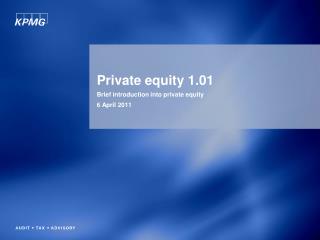
Private equity 1.01
Private equity 1.01. Brief introduction into private equity 6 April 2011. Introduction Roy Stegeman. CARe. Saval / Knowsley. Royal Sanders. Kirin Agribio. Brunotti. KPMG Corporate Finance. KPMG Corporate Finance. KPMG Corporate Finance. KPMG Corporate Finance.
383 views • 0 slides

PrIVATE EQUITY
PrIVATE EQUITY. CAPITAL MARKETS AND FINANCIAL INSTITUTIONS. İNGİLİZCE İŞLETME DOKTORA PROGRAMI ALAATTIN YOLAÇTI. PresentatIon layout. PRIVATE EQUITY – OVERVIEW. 1. PRIVATE EQUITY FUNDS. 2. KEY ISSUES IN PRIVATE EQUITY APPLICATIONS. 3. PRIVATE EQUITY MARKET . 4.
1.07k views • 47 slides

An introduction to Private Water Systems
Wells. Springs. Cisterns. An introduction to Private Water Systems. Private Water System Regulations. No state requirements for construction, maintenance, treatment, etc. No ownership of water “Reasonable use” of water allowed Little protection for existing sources
326 views • 22 slides
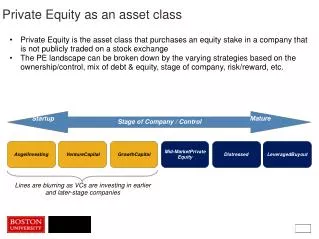
Private Equity as an asset class
Private Equity as an asset class. Stage of Company / Control. Startup. Mature. Private Equity is the asset class that purchases an equity stake in a company that is not publicly traded on a stock exchange
503 views • 31 slides
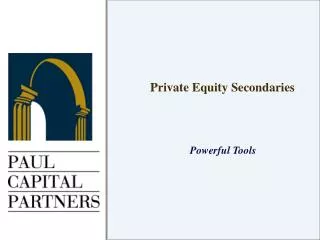
Private Equity Secondaries
Private Equity Secondaries. Powerful Tools. Primary Private Equity Funds. LP. LP. LP. LP. LP. Unfunded. GP. FUND. E1. E2. E3. E4. En. LP. LP. LP. LP. LP. FUND. GP. E1. E2. E3. E4. En. Secondary Funds acquire interests in existing PE portfolios. Secondary Fund. LP.
717 views • 22 slides

Private Equity An introduction
GDA Consulting. Private Equity An introduction. 26 th June, 2014. Pune. Introduction. The 4M’s for running any business. Introduction. GDA Consulting. Money Capital/Finance/Basic force to turn on and keep running, the business.
308 views • 13 slides
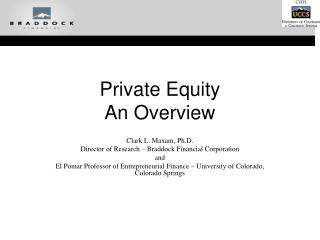
Private Equity An Overview
Private Equity An Overview. Clark L. Maxam, Ph.D. Director of Research – Braddock Financial Corporation and El Pomar Professor of Entrepreneurial Finance – University of Colorado, Colorado Springs. Private Equity – Broadly Defined.
336 views • 19 slides

An Owner Operator’s Guide to Private Equity
The world of Private Equity (PE) can be unfamiliar for many owner operators of ASC and other outpatient surgery centers.
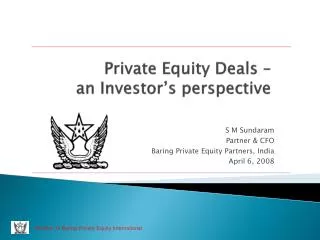
Private Equity Deals – an Investor’s perspective
Private Equity Deals – an Investor’s perspective. S M Sundaram Partner & CFO Baring Private Equity Partners, India April 6, 2008. “Some men see things the way they are and ask why . Others dream of things that never were and ask why not ” . - George Bernard Shaw.
470 views • 27 slides
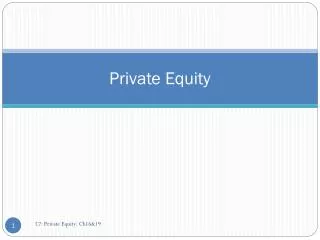
Private Equity
Private Equity. Private Equity. Private equity can be broadly defined to include the following different forms of investment:
811 views • 35 slides

Welcome to America 2030™ Equity An American Private Equity
Welcome to America 2030™ Equity An American Private Equity Sponsor of Institutional Grade U.S. Real Estate Investments Understanding and Investing in American Multifamily Apartment Buildings, The Greatest Asset Type of the Real Estate Asset Class. Why Buy American Real Estate?.
654 views • 51 slides

private equity
private equity. Topics for today. What is venture capital? What do VCs look for? VC process VC value added process VC terms. What is Venture Capital?. Investments in early stage small or medium sized, unlisted companies,
378 views • 21 slides
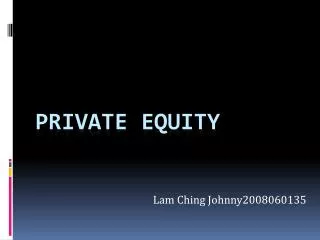
Private Equity
Lam Ching Johnny2008060135. Private Equity. Outline. What is Private Equity? - stages of investment - types of equity transaction - investment process Private Equity in Asia - China - Hong Kong The Blackstone Group L.P. What is Private Equity?. Long term equity funding
512 views • 11 slides

Private Equity
Private equity is a source of investment capital from high net worth individuals and institutions for the purpose of investing and acquiring equity ownership in companies. http://www.directprivateoffers.net/
267 views • 15 slides
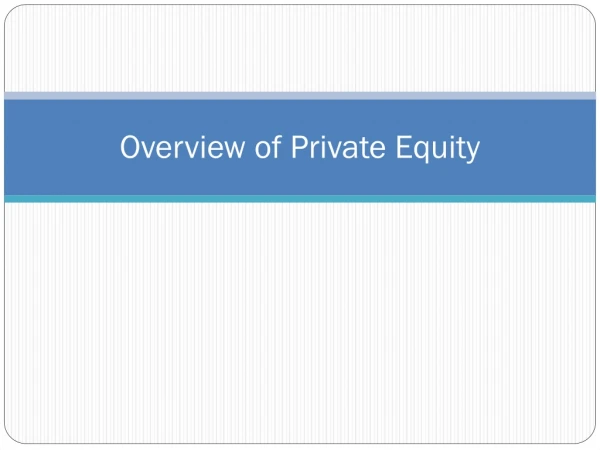
PRIVATE EQUITY
private equity technique
463 views • 36 slides


















